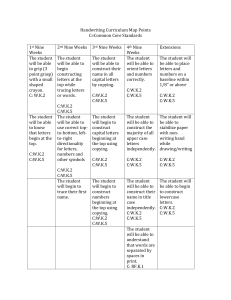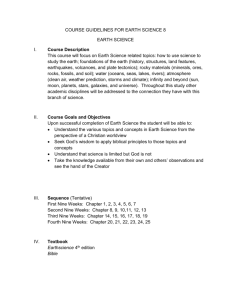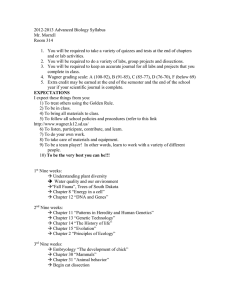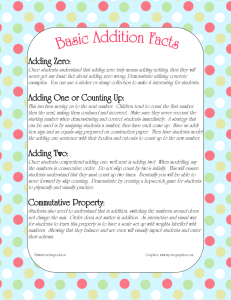4th Grade Curriculum Night
advertisement
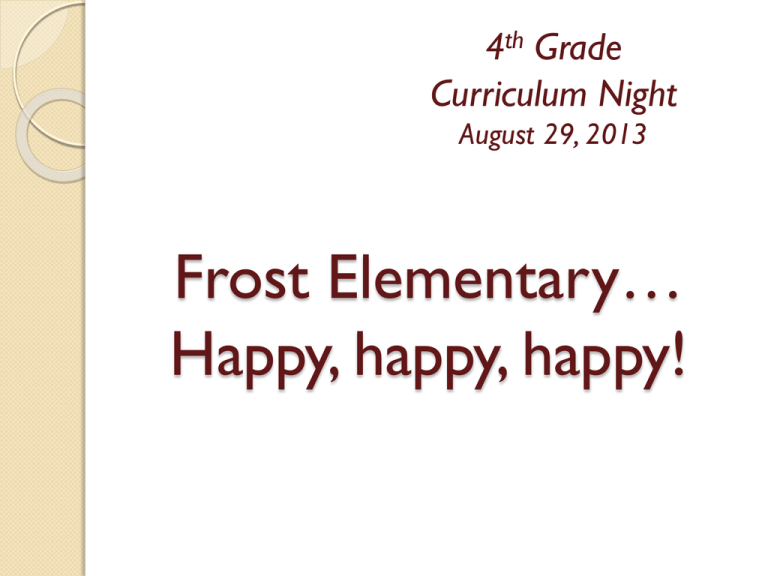
4th Grade Curriculum Night August 29, 2013 Frost Elementary… Happy, happy, happy! GENERAL INFORMATION Food Service 2013-14 Meal Prices Breakfast - $1.10 Lunch PK-8 - $1.80 Lunch Visitor - $3.00 Student lunch numbers are the same as their student ID#. This should never change as long as they are enrolled in LCISD. Bar code scanners are on order to help schools manage the speed of service. Food Service 2013-14 (cont.) Updated meal charge policy – Students are allowed to charge up to -$15.00. After reaching this, a student will receive milk and cereal for breakfast and a cold cheese sandwich and milk for lunch. The account will be charged $0.50 for this alternate meal. No charging is allowed by adults. The district meal charge policy will take effect September 3, 2013. Food Service 2013-14 (cont.) After a student receives 10 alternate meals the parents will need to make arrangements to provide a lunch for their child. Our automated calling system will call phone numbers listed to remind families to send money to avoid receiving alternate meals. Please make sure to update your contact information with the district. Pay online at www.parentonline.net All schools have copies of the free/reduced meal application if needed. Food Service 2013-14 (cont.) New meal requirements: o Students must take ½ cup fruit or vegetable at lunch to complete a reimbursable meal. o There is no longer an entrée. A student must take 3 components to complete a meal. No beverage is required. o LCISD practices ‘offer vs. serve’. Students need to be allowed to make their own choices. o No juice will be offered at lunch. o There will be no more syrup. New items such as prepackaged mini-pancakes, mini-waffles, and French toast sticks will have syrup flavor cooked in the product. Birthday Guidelines In accordance with district policy, we discourage food being brought in by parents/grandparents for the following reasons: protect instructional time; student food allergies (peanut, gluten, eggs); student medical conditions (diabetes); liability assumed by person bringing in food Flowers, balloons, pencils, invitations and any other treats in honor or recognition of a child’s birthday cannot be delivered or distributed at school. Lunch Drop-off Once the school day begins, parents will want to follow these guidelines to drop off lunches: o Check in at the front office and receive a visitor’s name badge. o Proceed to the cafeteria with the lunch. o Place the lunch in the appropriately labeled bin near the cafeteria kitchen. o Students and/or teachers will check the bin at the beginning of the lunch period for their class. Dress Code Red, white, light blue or navy blue collared shirts are allowed. Tops may not have any visible logos. Viewable undershirts should be one of the uniform shirt colors. Sweaters and jackets must be solid red, navy, black, khaki or white. Khaki, navy, black, blue denim slacks, shorts, skirts, skorts and jumpers are permitted. School shirts and sweatshirts are allowed. Leggings and tights should be red, black, blue, white or khaki. No backless shoes, flip flops, overalls, hats, caps, scarves, skate shoes, sweat pants, or rolling backpacks are allowed. Fourth Grade Swimming 3/28-3/31 & 4/3-4/11 Fourth graders will be participating in swim lessons at the Natatorium. Students will ride the school bus, and permission slips will be sent home at a later date. Students will need a swimsuit, and girls will be required to wear a one-piece suit. Towels will be provided. Students are only to bring their swim suit, a plastic bag, and a comb or brush. ATTENDANCE and TARDIES New Tardy Policy Students are counted as tardy if they are not in the classroom by 7:45 a.m. Students with excessive tardiness will be referred to the attendance committee for consideration of ISS and a home visit by the social worker. Three or more tardies in a 9 week period will disqualify students from attendance awards. Good Attendance Celebrations Tardies will be recorded by the front office and reported to the classroom teacher at the end of each nine week grading period. Students are considered tardy if they are not in the teacher’s class by 7:45 a.m. Students with less than 3 tardies or early check outs within a given 9 weeks will be eligible for participation in a good attendance prize drawing. The only exception to this requirement is a student bringing a medical excuse. COMMUNICATION Newsletters Beginning on Sept. 3rd, all grade levels will post a copy of the newsletter on the Frost Elementary website and will do so each Monday evening during the year. In addition, an email blast will be sent out to grade level parents with the newsletter attached. Newsletters will include special events, birthdays, learning objectives, assessment dates and any other information deemed necessary by the grade level team. Access to the newsletters is at: http://www.lcisd.org/campuses/frost/about/newsletters Agendas Students record homework and other important information. Parent/guardian initial daily. should sign or Communicating with Your Child’s Teacher E-mail Telephone – You can contact your child’s teacher by calling the direct extension. Please note that phones do not ring during school day hours. We are generally able to respond quickly; however, in some instances, please allow 24 hours for a response. Transportation changes should be made in writing or by calling the school office at 832-223-1500. Homework We believe that homework is a valuable aid in helping students make the most of their experience in school. Homework will be given Monday-Thursday and occasionally over the weekend. Math homework will often include a spiral review. Homework should take not more than 60 minutes. Infractions are given for missing homework. BEHAVIOR Behavior Each teacher carries a clipboard. After 1 to 2 warnings, a student will receive an infraction for breaking a rule. Parents will be notified on a daily basis through the agenda. Nine Week Behavior Expectations Infraction chart by grade level: Grade Level Expectations Kindergarten S = 0-8 color changes/infractions N = 9+ color changes/infractions All other grades 1st-5th S = 0-8 color changes/infractions N = 9-12 color changes/infractions U = 13+ color changes/infractions Conduct grades will include infractions received for no homework. Office referrals will be counted as 9 infractions. Therefore, a student will receive no better than an “N” in conduct in nine weeks where behavior has resulted in an office referral. Students who choose to participate in clubs must maintain an S in conduct. N’s in conduct will result in a 4 week probationary period. U’s and F’s will mean dismissal from clubs. Nine Week Behavior Celebrations Students from each classroom will be honored for their winning behavior each nine weeks. Celebrations are coordinated by grade level volunteers. We need at least three parents/each celebration. Celebrations are generally scheduled for the Friday after the nine weeks ends, from 2:052:35 p.m. Other classroom-specific incentives may be offered from time to time. LCISD Grading Policy All corrections on daily graded work must be made in school. Any work that is to be graded will not be sent home for completion. Students will not be given make-up work ahead of time when parents remove their children for trips during school days. Late Work Policy – classwork will be accepted late within the current grading period with these guidelines in place: One (1) day late = 0 points off Two (2) days late = 10 points off Three (3) days late = highest grade possible is a 70 Extenuating circumstances will be reviewed by campus policy. Reassessment (Daily Grades) The teacher shall provide one reasonable opportunity to reassess failure to master the TEKS/Curriculum in each daily grade. The highest possible grade that can be earned and recorded on the reassessment is a 70. There will be no reassessment based on lack of effort. The teacher will make a note in the electronic grade book of the date and grade of the reassessment. Original grades will be recorded in the notes section. Reassessment (Test Grades) A teacher shall provide one reasonable opportunity to reassess failure to master TEKS/Curriculum on each test grade. There will be no reassessment based on lack of effort. Teachers will reteach and allow students an opportunity to retest the objectives not mastered. The highest possible grade that can be earned and recorded on the reassessment is a 70. The teacher will make a note in the electronic grade book of the date and grade of the reassessment. Original grades will be recorded in the notes section. Elementary 9 week assessments and student projects are not subject to reassessment. Report Cards/Progress Reports Report Type Date Report Sent Home Progress Report – 1st Nine Weeks Thursday, September 26, 2013 Report Card – 1st Nine Weeks Thurs.-Fri., November 7-8, 2013 (Parent Conferences) Progress Report – 2nd Nine Weeks Thursday, December 12, 2013 Report Card – 2nd Nine Weeks Thursday, January 23, 2014 Progress Report – 3rd Nine Weeks Thursday, February 20, 2014 Report Card – 3rd Nine Weeks Thursday, April 3, 2014 Progress Report – 4th Nine Weeks Thursday, May 1, 2014 Report Card – 4th Nine Weeks Thursday, June 5, 2014 Skyward Family Access Replaces the Classroom Connection Center PCG portal Allows parents to track student grades and progress Go to www.lcisd.org and click on the Family Access button at the top of the page. Sign in with your username and password. Update all email addresses associated with your account. Parent Conference Dates Teachers will meet with parents to review student progress for the first nine weeks. Conferences will be held on November 7th and 8th. The first nine weeks report card will be distributed at the conference. ASSESSMENTS Common Formative Assessments (CFA) CFAs are formative assessments – they inform teachers and students ‘of’ learning (that which has already occurred). Research shows that schools that consistently used CFAs showed the greatest improvement in student achievement. Students will take a CFA once per nine weeks in the areas of reading, science, writing and math. Data from the CFA will be used to form small groups and guide instruction. CFAs are not graded but are used diagnostically and to better facilitate student learning and provide feedback for students. Common Assessments Common summative assessments are major tests that are given at the 8-9 week mark of each grading period. These tests are to be completed by the student in one class period. Common summative assessments are not subject to reassessment guidelines and will be weighted at 200%. Assessments will be given in math, reading, language, science and social studies. STAAR (State of Texas Assessment of Academic Readiness) by Grade Grade Level: Subject: Subject: Subject: 3rd Grade Reading Math 4th Grade Reading Math Writing 5th Grade Reading Math Science STAAR (State of Texas Assessment of Academic Readiness) More questions with a higher cognitive complexity level to match the TEKS Greater emphasis on critical thinking and reading across different genres Two essays required in writing Assessing process skills with content skills in mathematics and science Greater number of open-ended (griddable) questions on mathematics and science STAAR is timed – 4 hours STAAR (State of Texas Assessment of Academic Readiness) Testing Dates (2013-2014): April 1st – 5th Math, 4th Writing (Day 1) April 2nd – 5th Reading, 4th Writing (Day 2) April 22nd – 3rd/4th Math April 23rd – 3rd/4th Reading, 5th Science STAAR is a timed test. Students will be allowed 4 hours to complete each test. ENGLISH/ LANGUAGE ARTS & READING English Language Arts Grading Language Arts: Writing 40% Oral and Written Conventions * Grammar * Handwriting * Capitalization * Punctuation * Spelling Research 10% Listening and Speaking 10% 40% 3rd-5th Grade Spelling 2013-2014 • Teachers will not administer a pretest on Monday. • Spelling tests will occur on Friday each week. • There will be no advanced lists. • Students will receive one grade for spelling based on a test of review words each nine weeks. • 3rd grade - 20 words • 4th grade - 20 words • 5th grade - 25 words Guided Reading As part of our Balanced Literacy curriculum, teachers will differentiate reading instruction through Guided Reading. Teachers will use assessment data to plan and adjust small group Guided Reading lessons. Groups will be flexible and will focus on specific strategies and skills needed by students. Students will rotate between literacy-based activities, independent reading, and meeting with the teacher as part of our Reader’s Workshop approach. Reading • Every student will be required to read for 100 minutes at home. • Reading should be recorded in student’s agenda and reflect 100 minutes per week; 20 minutes should be recorded each day. • Students should record the title and page numbers in agendas. Reading Novel Studies Expository Text Historical Fiction Poetry Short Stories Focus on small group instruction MATH 4th Grade Goal: Each student has exposure and understanding of all four operations: 1. Addition 2. Subtraction 3. Multiplication 4. Division Covered Topics: 1. 2. 3. 4. 5. 6. 7. Place value/decimals Fractions Problem Solving Identifying Patterns Measurement Geometry Probability Guided Math Implementation of guided math consists of: Whole group instruction: 1-2 days a week, primarily to introduce a new concept or topic Small group instruction: 3-4 days a week so that teachers can effectively monitor student understanding and tailor instruction to meet needs of all students Math workstations: 3-4 days a week during the guided math cycle Fact Fluency: 3-4 days a week during the guided math cycle EPSE Problem Solving Method What is EPSE? • In mathematics, students continually use problem-solving, language and communication, and reasoning (justification and proof) to make connections within and outside mathematics. EPSE is a method in which students can explore a problem, plan and solve it, then explain their thinking. • What does each letter stand for? E – Explore: Fact Finding P – Plan: How will I solve this problem? S – Solve: Find the answer. E – Examine: Show or explain how the answer is reasonable. EPSE at Frost Elementary At Frost, teachers will implement EPSE with fidelity. Students will have time for guided and independent practice in the classroom. Grades 2-5 will include one EPSE problem for homework two days a week (Mon. & Wed.) Grade 1 will begin including EPSE homework in the 3rd nine weeks. For homework and assessments, students will only be required to practice and master the sections of EPSE that have been taught previously by the classroom teacher. SCIENCE Problem Solving We want to challenge our students by providing them with real-world and hands-on experiences. Covered Topics Science Lab Safety Weather Earth and Space Plants and Soil Animal Adaptations Matter Forms of Energy SOCIAL STUDIES Texas History Geography Regions Native Americans Government History of the state Parent Volunteers Volunteers are always appreciated! Please note LCISD is required by state law to obtain criminal history record information on volunteers in the district. Confidential volunteer forms are available from the office. Help Needed! Team Celebration helpers are needed at the end of each nine weeks to celebrate the success of the winning teams. Please sign up to help. You can help by volunteering to chaperone the party each nine weeks. (About 30 students will attend and we need a minimum of 3 parent helpers.) Coordinated by 4th Grade Room Moms More Help Needed! We also need help with our large bulletin board displays in the 4th grade hallway. This display is changed each 9 weeks. Fourth grade team will provide a theme and student display samples. The first one is already up … only 3 more to go! QUESTIONS? Thank you for coming!


